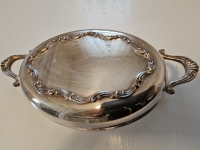Great article on THD sloppy joe's
Order a Sloppy Joe in Jersey and You
Won't Find Ground Beef
Jun 8, 2015 9:00AM Drew Lazor Contributor
What ordering a Sloppy Joe will get you at the Town Hall Deli in South Orange, NJ. [Photographs: Drew Lazor]
The origin story of this quintessential New Jersey sandwich begins in a place everyone expects a New Jersey sandwich story to begin: ¡Cuba!
The year was 1934, or maybe 1935. The North Jersey town of Maplewood, just outside Newark, was presided over by Mayor Robert Sweeney, a politician with a Guys and Dolls- esque penchant for partying down Havana way. Sweeney loved fishing, gambling and drinking in Cuba, and was especially fond of a tavern they called Sloppy Joe's.
After one particular jaunt, Sweeney returned home with a serious and specific craving stowed in his carry-on: a sandwich he'd tried, and loved, at his favorite Havana bar. He convinced Heinz Burdorf and Fred Joost, countermen at the Town Hall Deli in neighboring South Orange, to engineer it from his memory: beef tongue, ham, Swiss, cole slaw, and Russian dressing, meticulously layered between three long slices of rye bread and cut into eight Mondrian-perfect squares.
The sandwich, named for the watering hole of its supposed conception, caught on in the area, and people took to subbing various deli meats, like roast beef, turkey, or pastrami, in and out of their orders. Sweeney, recalls Burdorf's son, Jack, used to joke that he deserved royalties for every single Sloppy Joe sold, though he probably wasn't joking.
For Town Hall, which is still open today (and still employs Jack Burdorf), this is the official background story, the series of events that allowed the 88-year-old deli to add a second line to its sign: "Birthplace of the Sloppy Joe." There are dozens of other North Jersey shops that make this sandwich and refute this claim, but that's not even the confusing part. What this particular Sloppy Joe has to do with that other Sloppy Joe—the one the rest of America knows, made of loose ground beef in a ketchupy sauce on a burger bun—is the messier question.
The Jersey Sloppy Joe is more incremental: a little pastrami here, a hunk of smoked turkey there. A cavalier glob of crunchy slaw on my breast pocket, a dribble of tangy Russian down my sleeve. A couple breadcrumbs on my chin, and more than a few more down the soul- snacking Sarlacc Pit that is the gap between the driver's seat and the center console.
If they called them Neat Joes, I would call them liars.
Probably not the best sandwich to eat in the car, but I can't claim I wasn't warned. If they called them Neat Joes, I would call them liars.
At the Millburn Delicatessen in Millburn, the Joes are sloppy but their construction is careful. The "Original" is Dagwood-stacked on rye slices and cut into three wedges that offer identical levels of shirt-staining peril, is monstrous. The "Monster," offering "double the meat," is titanic. And you can go even further in satisfying your inner I.M. Pei, adding additional meat tiers at a dollar per. No matter what you go with, the sandwich is put together the same way: more or less a reuben except served cold, with a bonus meat and an extra floor.
For Ron and Diana Fluke, who have owned the nearly 70-year-old deli since 1991, this is the default Sloppy Joe—not the dad's-night-to-cook ground beef/tomato sauce/bun setup so familiar to most Americans, especially fans of the movie Billy Madison.
According to Diana, some of their regulars aren't even aware that another type of Sloppy Joe exists. "Out-of-towners have said, 'Oh, I expected hamburger meat with red sauce,'" she says. "The locals look at them like 'What's he talking about?' They don't even know what the meat with red sauce is."
That wasn't the case for the Flukes, who came to Millburn from Hackettstown, less than an hour away. Even that close by, a Sloppy Joe does not deviate from the accepted Manwich ideal. "We came here, and I said, 'Uh, cole slaw?'" says Diana.
Eddie Levy, a Brooklynite who owns Deli King in Linden, was similarly flummoxed when he purchased his kosher establishment nearly 30 years back. "I'm a New Yorker, so when I heard Sloppy Joes, I had the same reaction as everybody else," he says.
Inside the Millburn Deli
It's all very The Village, this tight enclave of suburban counties that sticks to its own
definition of an American school-lunch classic, blissfully unaware of the ground beef developments beyond their borders. What's even more curious is that Sloppy Joe's, the recently revived Cuban establishment said to have inspired Hizzoner Sweeney to bring this top snack back to the Garden State, seems to be credited with inspiring both sandwiches.
Originally owned by a not-that-tidy Spaniard named Jose (or so they say), Sloppy Joe's reopened in Havana in 2013 after sitting dormant for a near half-century. Nowadays, they serve a ground-meat Sloppy, which makes sense. Starting back when Ernest Hemingway was a regular, the bar was said to offer a sandwich version of ropa vieja, the Cuban peasant dish of slow-cooked shredded beef that's much closer to the standard Sloppy Joe than North Jersey's. But then there are contrary reports, like an old Reuters filing that speaks of the bar's "inch-thick ham-and-cheese sandwiches on rye."
To complicate things further, and why not at this point: the Key West landmark Sloppy Joe's, said to be named after the Havana bar at the behest of Papa himself, also says it invented the Sloppy Joe (the ground beef one). There's also talk of a short-order cook from Sioux City, but let's not worry about him.
The Millburn's Sloppy Joe
It's entirely possible that Sloppy Joe's, in Cuba, served both types of sandwiches, and they both infiltrated American sandwich lore at different junctures, growing in notoriety independent of one another. But when it comes to the topic of Jersey's Joe, the folks at Town Hall stand firm.
"The way they're made at the Town Hall—I assure you that it's the original Sloppy Joe sandwich," says Jack Burdorf, whose father, Heinz, was one of the deli men credited with constructing Joe 1.0, based on Sweeney's Cubano specs. "It's been done that way since the very first Sloppy Joe. Eight double-decker squares, two meats, cole slaw, Russian, Swiss cheese."
With partner Joost, Heinz co-owned the Town Hall for a time, and the same goes for his son, though Jack sold the business to current proprietor Tony Wonski in 2003. Now 76, he's still involved in the day-to-day, working behind the counter part-time Tuesday through Friday.
Wonski's son, Matt, oversees the operation, which will make 40 or so Joes on a slow day
and hundreds during peak periods—Christmas, New Year's, and the Super Bowl. He's in charge of keeping everything on pace during those busy times, a challenge considering how involved his Sloppy Joe process really is.
Instead of sawing off slices from top to bottom, Wonski sticks an entire Pullman-style loaf of soft rye into a slicer belly-side-down, producing three long, thin rectangles of bread. An initial layer of sliced meat starts the sandwich off, skillfully folded back around the edges, before that's topped with a liberal blanket of cabbage Wonski fusses with to ensure evenness. (This is called "pushing the slaw.") Then comes the Russian, then cheese, then more bread.
Wonski repeats those steps for the second layer, adding a swipe of butter to the underside of the top piece of bread to seal out moisture from the slaw and dressing. Then comes the final touch, after the Joe is segmented into eight equal parts: It's placed in a branded cake box and tied up with a bit of string, giving it the look of a lovely hostess gift a lady could bring to bridge night on an old black-and-white sitcom.
The painstaking approach ensures "each bite tastes exactly the same," says Wonski. "It takes people a long time to learn how to do this...a good couple months before they do it right." The sandwich has to be on point for out-of-town customers—through the delivery service Goldbely, they've shipped Sloppy Joes to homesick Jersey natives all the over the country (Michigan and New Mexico, recently).
Given the individually-sized cubes, Town Hall's Joe ranks a little lower on the need-a- napkin scale than its competitors. "It's not supposed to overly messy," says Jack. "It's a neat type of sloppiness."
The historical roots of the North Jersey Joe are neat yet sloppy, too. Millburn Deli co-owner Ron Fluke doesn't buy Town Hall's telling, or any others. "There's a lot of rumors about certain delis inventing it. No deli invented it, I know that," he says. "I know that from the owner we bought [our deli] from. He and his wife came over from Eastern Europe. It came in through Ellis Island with the immigrants."
The image of a Sloppy Joe, swaddled in a babushka while the bitter Upper Bay air whips through its slaw, is a romantic one, but Levy of Linden's Deli King always goes with a more pragmatic tale when asked about the genealogy of his top-selling sandwich. He heard it started as a way to make use of the perfectly good but un-sellable ends of roasts, which deli
guys would chop up and combine with the requisite Joe ingredients as a staff snack. (Deli King slices only the finest center cuts for theirs, Levy's sure to stress.)
Cuba, the Eastern Bloc, the basement prep kitchens of the third state—all of these locales possess compelling, if circumstantial, claims when it comes to the genesis of the Sloppy Joe. It tends to play out this way when the topic is American sandwich-craft, as the paths of our most populist foods are often the most difficult to trace.
But one fundamental experience will never change for any of these places: the uninitiated eaters, stopping in to ask what's up with seasoned beef slapped on a burger bun.
"Everybody else in the world only knows that other sandwich," says Wonski. North Jersey's Sloppy Joes are ready to be known, too, so long as you're willing to come to them.










http://www.seriouseats.com/2015/06/new-jersey-sloppy-joe.html